Takatani stretches streak of national titles; Kanazawa wins historic GR crown
Thursday, December 22, 2022 - 17:22 By Ken Marantz

TOKYO (December 22) -- As veteran Sohsuke TAKATANI balances a number of off-the-mat pursuits, he still managed to extend his streak of national titles to the second-longest ever, while a Tokyo high schooler nearly half his age also etched his name in the history books.
Takatani held on for a 12-8 victory in the freestyle 92kg final over teen collegian Arashi YOSHIDA to notch his 12th straight title on the opening day of the Emperor's Cup All-Japan Championships on Thursday in Tokyo.
A short time earlier, Kohaku KANAZAWA became the first-ever high schooler to win a national crown in Greco-Roman when he scraped out an 8-7 victory over world U20 bronze medalist Taiga ONISHI at 55kg in the tournament serving as the first of two domestic qualifiers for next year's World Championships in Belgrade.
And in the first of what will be a succession of battles between current Olympic and/or world champions and medalists over the four-day event at Tokyo's Komazawa Gym, world silver medalist Ami ISHII and world 65kg champion Miwa MORIKAWA advanced to a highly anticipated final in the women's 68kg division.
The clashes of the titans on tap are all due to the tournament's link with the 2024 Paris Olympics. As the Japan federation has decreed that a wrestler who wins a medal in Belgrade in an Olympic weight will automatically fill the spot in Paris that they have secured, that has added urgency to qualify for Belgrade, particularly among the women, where a world medal is accessible. It has also funneled the top wrestlers into the six Olympic divisions in each style.
All wrestlers who lose here will get another shot in June at the second qualifier, the Meiji Cup All-Japan Invitational Championships. Winners of both tournaments will automatically earn a ticket to Belgrade, with a playoff determining the spot if the winners are different.
For this year's Emperor's Cup, the federation tweaked the format by running the Olympic weight classes over two days, the same as is done at the Olympics and the worlds. Non-Olympic weights are being started and ended on the same day.

Takatani, the 2014 world silver medalist at 74kg who plans to move down to 86kg at the Meiji Cup in a bid to make his fourth Olympics, advanced to the 92kg final with a pair of technical falls, but met some unexpected resistance there from national collegiate champion Yoshida of Nihon University.
The 33-year-old Takatani stormed to an 8-0 lead with a driving takedown and three rolls off a lace lock. But Yoshida, whose Iranian father runs the kids' wrestling club in nearby Chiba Prefecture where he got his start, came back with a takedown to cut it to 8-2 at the break.
In the second period, Yoshida scored three more takedowns to offset a takedown and two stepouts by Takatani, but it wasn't enough to dethrone the champion, whose run of titles has come over four different weights. The 12 crowns overall also put him in fifth place on Japan's all-time list of total titles, one behind both Kaori ICHO and Saori YOSHIDA.
"I've been working hard every year and I've kept it going well for 12 years," Takatani said. "Many young wrestlers have put up a challenge and it's my mission to keep from losing."
As he keeps his career going, the outgoing Takatani also stays busy as the head coach at his alma mater, Takushoku University, by preparing for a doctoral course at Tsukuba University, and as a new father after his wife gave birth to their first child, a son, in September.
"I thought about entering at 86kg here, but I thought that if I put out energy too early, I would peter out in the second half," he said. "So I decided I will build up a little more [mentally and physically] and then go for it. If I get a chance, I might give 97kg a try. But I think that would irritate some people."

In the Greco 55kg final, Kanazawa trailed 2-4 going into the second period against Waseda University's Onishi, but went ahead 5-4 with a gut wrench from par terre. Onishi came back to take the lead with a takedown to the back, but it was only temporary, as Kanazawa quickly reversed to go ahead 6-6 on criteria. He then added a takedown, and allowed only a late stepout for the win.
"I didn't feel any pressure and just went all out," said Kanazawa, who finished fifth at this year's world U17 in his international debut. "I'm surprised."
Kanazawa is a second-year student at Jiyugaoka Gakuen High School, the alma mater of 2021 champion Yu SHIOTANI, the world bronze medalist who has moved up to the Olympic weight of 60kg and a possible clash with Tokyo Olympic silver medalist Kenichiro FUMITA.

Meanwhile, Moe KIYOOKA, who pulled off an age-group double this year with titles at both the world U20 and world U23, defeated two of her World Cup teammates en route to her first senior national title at women's 55kg.
Kiyooka scored a first-period takedown and made that hold up for a 2-0 victory over Rino KATAOKA, who wrestled at 53kg on the young Japanese team that lost two close matches at the World Cup two weeks ago in the U.S. The top Japanese wrestlers skipped the World Cup because of its proximity to the Emperor's Cup.
In her opening match in the quarterfinals, Kiyooka chalked up an 11-0 technical fall over Ruka NATAMI, the Japan team's 57kg entry in Coralville.
"We didn't talk about this All-Japan tournament in particular," said Kiyooka, a freshman at Ikuei University. "But for me, while we were warming up, I kind of got an idea of how I could do and I felt that if there was something lacking, I had a week until the All-Japan and could make adjustments."
It was at the World Cup that Kiyooka was dealt her first career loss by a non-Japanese wrestler when she fell 3-0 to the world bronze medalist at 57kg Alina HRUSHNYA (UKR).
"The match I lost at the World Cup was one that I have to reflect on because it showed how weak-hearted I can be," Kiyooka said. "The opponent faced [Ikuei teammate] Tsugumi SAKURAI at the World Championships and I was there for that match, so I have an image of her as being strong. That made me feel weak. But because of that, I made sure to brace myself for this All-Japan."
Kiyooka said her goal remains a gold medal in Paris and at this point, she plans to drop to 53kg for the Meiji Cup, which would mean getting on a collision course with Olympic champion Mayu SHIDOCHI and 2021 world champion Akari FUJINAMI. Kiyooka faced Shidochi in this year's Meiji Cup final at 55kg and lost by technical fall.

Morikawa's striking means of motivation
When the dust settled at women's 68kg, Morikawa and Ishii were the last left standing in a field that included four current or past world gold or silver medalists, not to mention a pair of former world junior champions.
Morikawa advanced to Friday's final with a 3-0 victory over 2018 world junior champion Miyu IMAI in a rematch of last June's Meiji Cup final, also won by Morikawa. Imai, who went to the World Cup and split her two matches at 65kg, had set up the clash by edging 2021 world 72kg champion Masako FURUICHI, 2-1.
"Unlike recent competitions, I didn't have to cut any weight, so my condition was a little flat going into the tournament," Morikawa said. "I wondered if I would be alright."
Morikawa said that she moved up to 68kg -- her natural weight -- because her previous experience of dropping to 62kg left her too drained and she missed out on the Tokyo Olympics.
"Up to now, I've built up experience in the non-Olympic weight of 65kg, but I still have regrets to this day of not making it to the Tokyo Olympics," Morikawa said. "I thought that I don't want to have that feeling ever again.
"It's not like I want to win this tournament so much that I'll die for it, but I want to take the mat feeling that will definitely win it. I hope I can win it and get off to a good start [heading to the Olympics]."
Before each match, Morikawa showed what was providing her with extra motivation. As she waited at matside for the previous match to end, she wore a Japan national soccer team T-shirt with the No. 8 of striker Ritsu DOAN.
Japan's run into the knockout round of the recent World Cup in Qatar, where the Samurai Blue stunned powerhouses Germany and Spain in the group stage, thrilled and inspired the nation, none more so than Morikawa and her soccer-loving family.
"I watched more than half of the World Cup matches," Morikawa said. "I saw the final this week. On the Japan team, I really like Doan. I think there are parts of me that are similar to Doan's boldness. So when I wear his t-shirt or use his towel, it raises my motivation and gets me ready for what's ahead."
Ishii advanced to the final with a 12-2 technical fall over 2019 world U20 champion Naruha MATSUYUKI, but that came after surviving a scare against 2021 world silver medalist Rin MIYAJI in which she overcame a four-point deficit to post a 6-4 victory.
The 2022 world silver medalist looked flat in giving up a pair of first-period takedowns to Miyaji. But she used her counterattack to get back into the match and went ahead 4-4 on criteria with a takedown with 25 seconds left.
Ishii scored a last-second takedown when Miyaji stopped fighting after the back of her head collided with Ishii's front teeth. That opened up a cut that caused Miyaji to be taken to the hospital.
It was another physically painful ending for Miyaji. At the 2021 World Championships, her shocking victory by fall over Olympic champion Tamyra MENSAH STOCK (USA) in the semifinals was tempered by a serious knee injury she suffered in a loss in the final to Meerim ZHUMANAZAROVA (KGZ).

One anticipated match-up that didn't come off Thursday was at women's 76kg, where world bronze medalist Yuka KAGAMI pulled out of the competition with a torn right pectoralis major muscle after winning the opening match of her round-robin group.
That kept Kagami from a potential first meeting with 17-year-old world U20 champion Ayano MORO, who won all three of her matches by technical fall to make Saturday's final against Nodoka YAMAMOTO.
Moro, who is making her first appearance in a senior-level tournament, has not lost since being beaten by Ishii in the final of the national junior high school invitational in 2017. That run includes a 4-2 victory in the final of the Junior Queen's Cup in April over Yamamoto, who notched two impressive victories at the World Cup.
"This was my first Emperor's Cup, but I'm aiming to make the 2024 Paris Olympics, so it doesn't matter if it's the first," Moro said. "It's only natural to think of winning. That's what I practiced for. Since I started high school, I think this is the best I've ever wrestled."
Kagami said she suffered the injury 10 days ago in practice, and after being unable to launch any form of attack in her 2-1 victory over Yamamoto -- all points were scored on the activity clock -- she decided to withdraw.
Had there been one more entry in the seven-women field, she said she might have stuck it out, as it would have meant a straight knockout format and a maximum of three matches. But she said the prospect of four more matches would be too much to bear.
"During the match, I could hear it popping," Kagami said. "At the time, I could withstand the pain, but after the match, I couldn't move and had no power.
"Two and a half years ago I injured my ankle, and because it was my leg, I couldn't move. This time, I could use my left arm, so I tried to think of a way I could win. Still, this doesn't mean the Paris Olympics is completely gone. I can still reach [No. 1] at the next World Championships, so at least my goal has become clearer."
Day 1 Results
Freestyle
74kg (14 entries)
Semifinal - Daichi TAKATANI df. Jintaro MOTOYAMA by TF, 10-0, 3:oo
Semifinal - Kirin KINOSHITA df. Kota TAKAHASHI, 4-4
92kg (14 entries)
Gold - Sohsuke TAKATANI df. Arashi YOSHIDA, 12-8
Bronze - Takeshi YAMAGUCHI df. Akinobu TAKEUCHI by Fall, :20 (2-0)
Bronze - Ryoichi YAMANAKA df. Hikaru ABE by Fall, 4:51 (4-2)
Semifinal - Sohsuke TAKATANI df. Takeshi YAMAGUCHI by TF, 11-0, 3:21
Semifinal - Arashi YOSHIDA df. Hikaru ABE by TF, 11-0, 3:44
97kg (10 entries)
Semifinal - Takashi ISHIGURO df. Toyoki HAMADA by TF, 11-0, 3:45
Semifinal - Hibiki ITO df. Hiroto NINOMIYA, 4-2
125kg (10 entries)
Semifinal - Daiki YAMAMOTO df. Takuya HIGUCHI by Def.
Semifinal - Ryusei FUJITA df. Yuji FUKUI, 7-3
Greco-Roman
55kg (15 entries)
Gold - Kohaku KANAZAWA df. Taiga ONISHI, 8-7
Bronze - Shoya ITO df. Shu HIRATA by TF, 10-1, 1:54
Bronze - Mizuki ARAKI df. Kagetora OKAMOTO by Def.
Semifinal - Kohaku KANAZAWA df. Shoya ITO, 10-6
Semifinal - Taiga ONISHI df. Kagetora OKAMOTO by TF, 8-0, 2:21
87kg (10 entries)
Semifinal - Masato SUMI df. Daisei ISOE by TF, 8-0, :32
Semifinal - So SAKABE df. Kaito MIYAMOTO by TF, 9-0, 1:58
97kg (11 entries)
Semifinal - Yuta NARA df. Yuri NAKAZATO, 5-0
Semifinal - Masayuki AMANO df. Kyo KITAWAKI by Fall, 1:15 (8-0)
130kg (10 entries)
Semifinal - Shion OBATA df. Daigo NISHI by TF, 9-1, 3:57
Semifinal - Sota OKUMURA df. Ryuta KONO by TF, 11-2, 4:52
Women
55kg (14 entries)
Gold - Moe KIYOOKA df. Rino KATAOKA, 2-0
Bronze - Kanon YAMASHITA df. Ruka NATAMI, 9-4
Bronze - Neon GOMI df. Misaki YOSHIBA, 2-1
Semifinal - Moe KIYOOKA df. Kanon YAMASHITA, 12-6
Semifinal - Rino KATAOKA df Neon GOMI, 4-2
65kg (10 entries)
Gold - Mahiro YOSHITAKE df. Rin TERAMOTO, 5-3
Bronze - Misuzu ENOMOTO df. Nagisa ITO by TF, 10-0, 2:09
Bronze - Momoko KITADE df. Kaede HIRAI, 5-1
Semifinal - Mahiro YOSHITAKE df. Misuzu ENOMOTO, 12-10
Semifinal - Rin TERAMOTO df. Momoko KITADE, 2-2
68kg (9 entries)
Semifinal - Ami ISHII df. Naruha MATSUYUKI by TF, 12-2, 5:55
Semifinal - Miwa MORIKAWA df. Miyu IMAI, 3-0
76kg (7 entries)
Semifinal - Nodoka YAMAMOTO df. Mizuki NAGASHIMA, 4-0
Semifinal - Ayano MORO df. Nanaha TAKASU by TF, 10-0, 1:10

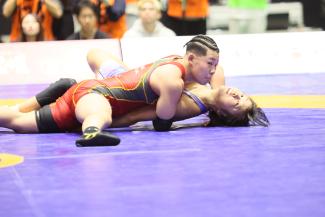
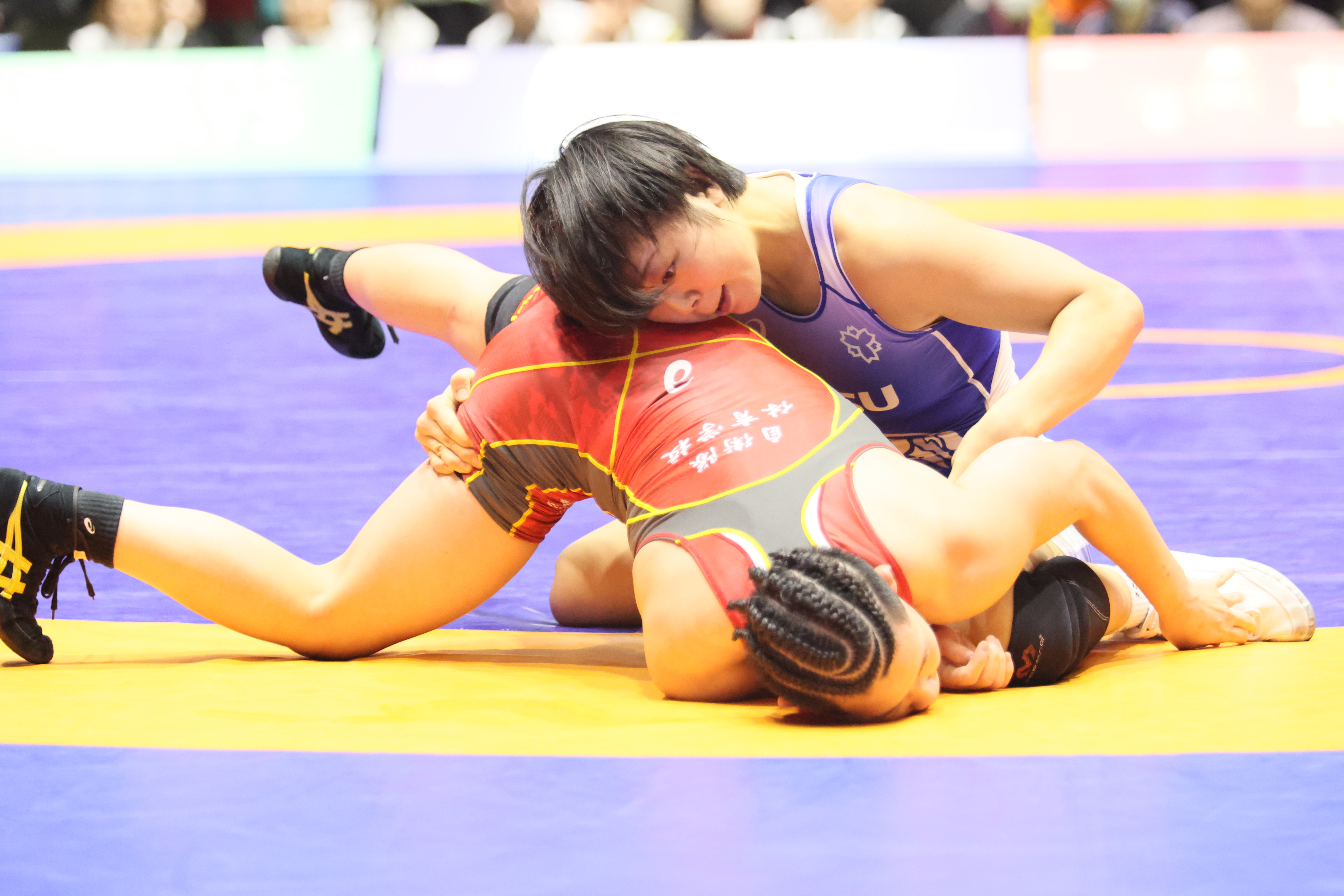 Akari FUJINAMI finishes up the winning takedown against Himeka TOKUHARA in the final minute of the women's 57kg final. (Photo: Takeo Yabuki / wrestling-spirits.jp)
Akari FUJINAMI finishes up the winning takedown against Himeka TOKUHARA in the final minute of the women's 57kg final. (Photo: Takeo Yabuki / wrestling-spirits.jp)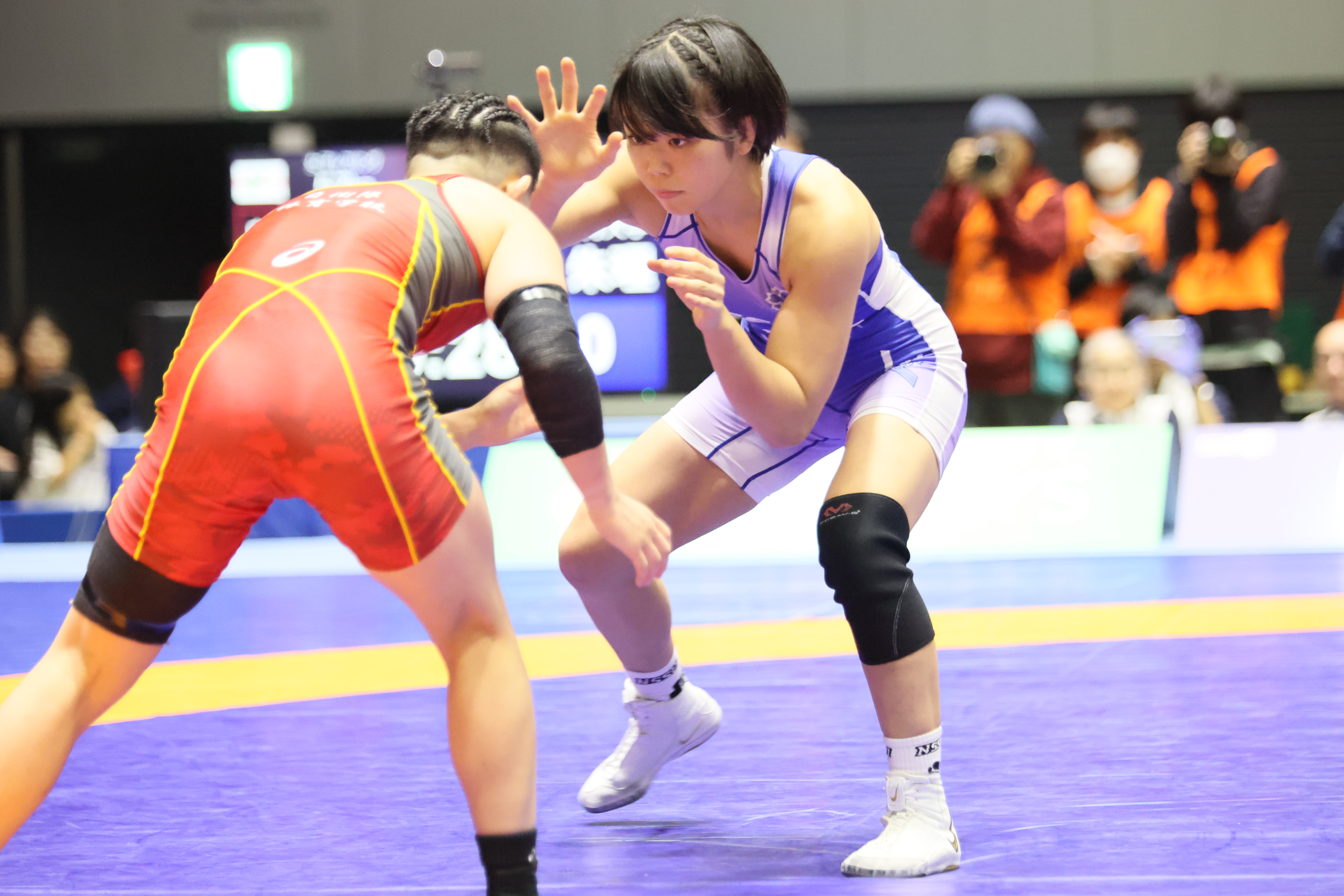 Akari FUJINAMI squares off with Himeka TOKUHARA in the women's 57kg final. (Photo: Takeo Yabuki / wrestling-spirits.jp)
Akari FUJINAMI squares off with Himeka TOKUHARA in the women's 57kg final. (Photo: Takeo Yabuki / wrestling-spirits.jp)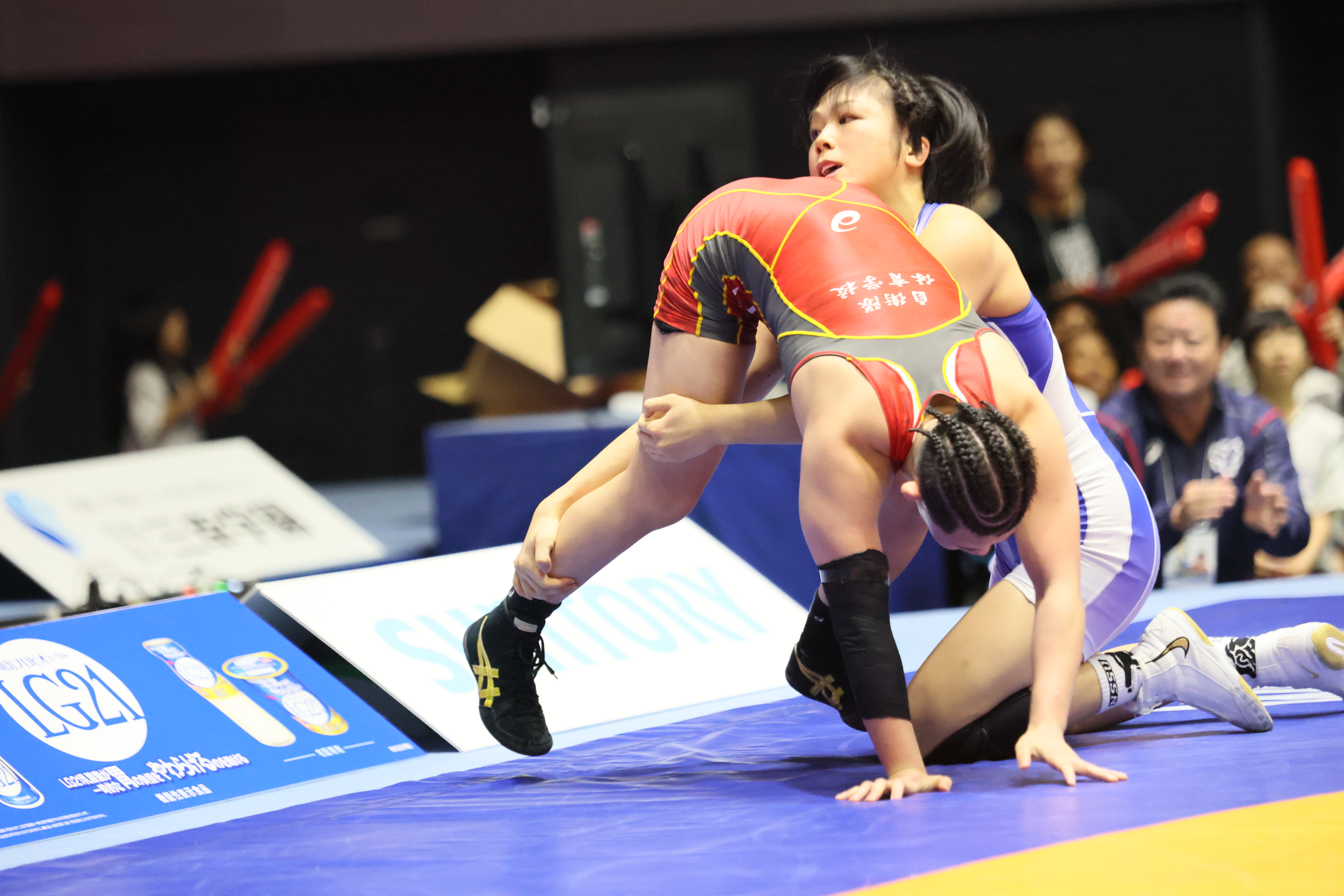 Akari FUJINAMI gets a stepout in the second period of the women's 57kg final. (Photo: Takeo Yabuki / wrestling-spirits.jp)
Akari FUJINAMI gets a stepout in the second period of the women's 57kg final. (Photo: Takeo Yabuki / wrestling-spirits.jp)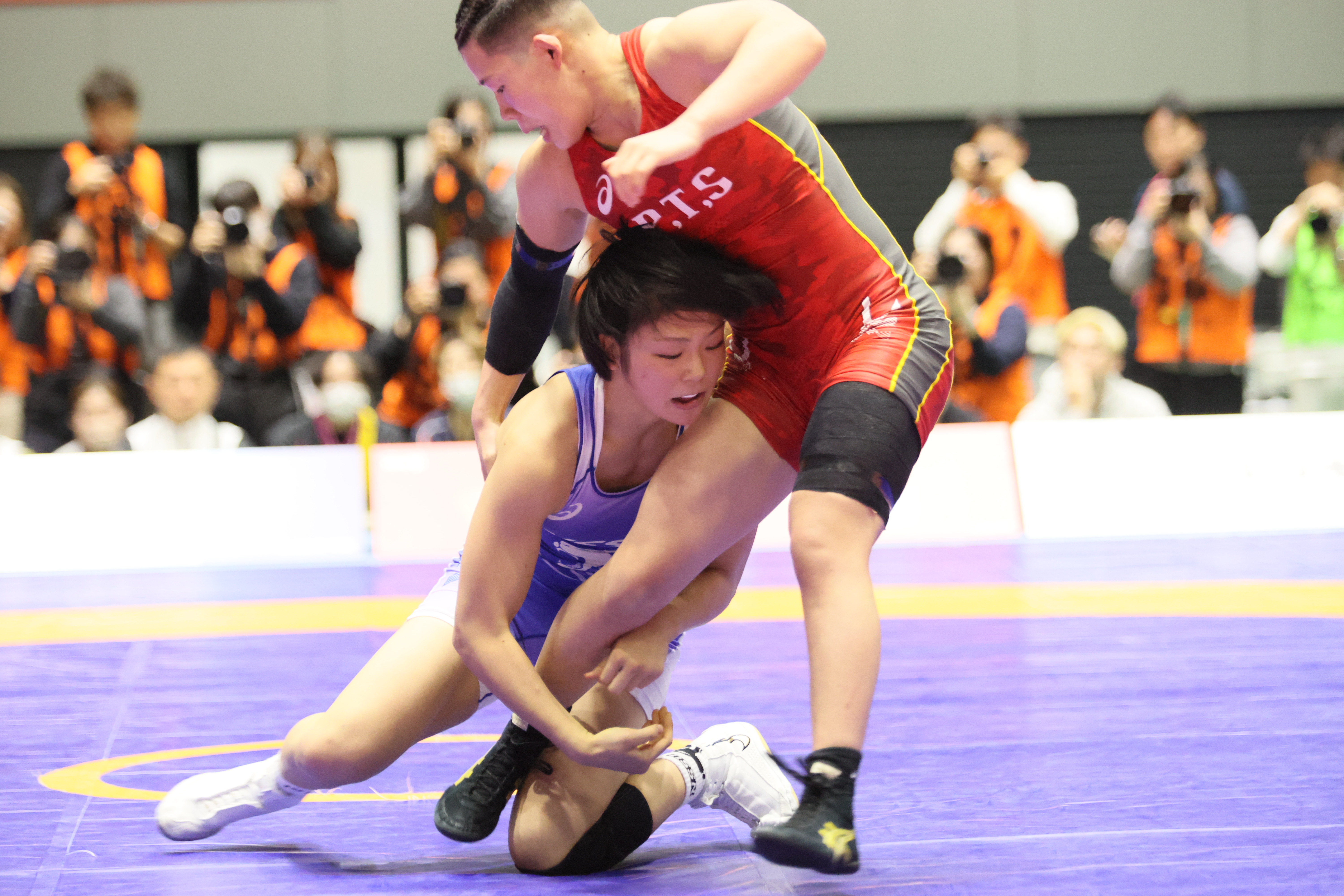 Akari FUJINAMI shoots for the winning takedown against Himeka TOKUHARA in the final minute of the women's 57kg final. (Photo: Takeo Yabuki / wrestling-spirits.jp)
Akari FUJINAMI shoots for the winning takedown against Himeka TOKUHARA in the final minute of the women's 57kg final. (Photo: Takeo Yabuki / wrestling-spirits.jp)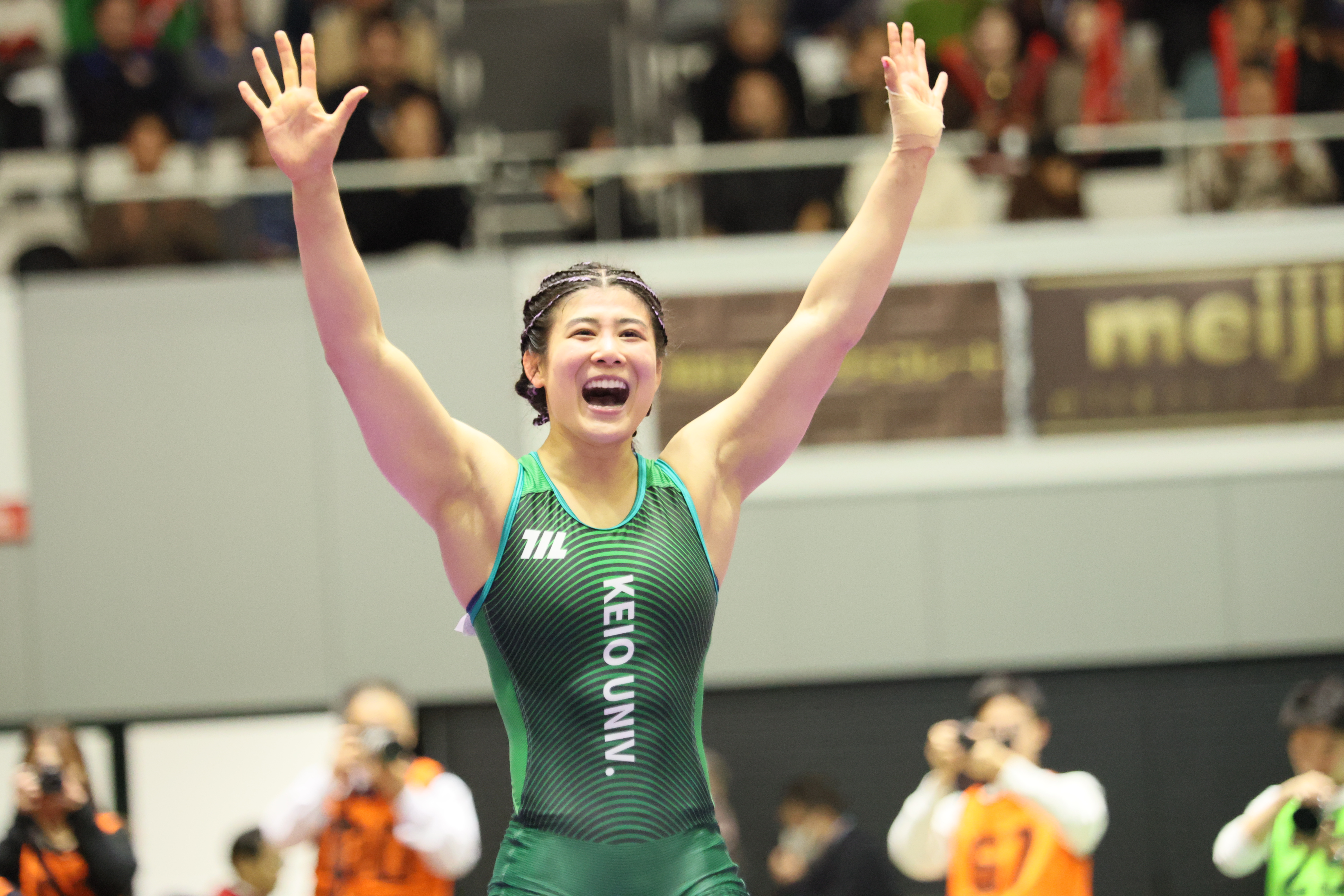 Nonoka OZAKI celebrates her victory over nemesis and Olympic champion Sakura MOTOKI in the women's 62kg final. (Photo: Takeo Yabuki / wrestling-spirits.jp)
Nonoka OZAKI celebrates her victory over nemesis and Olympic champion Sakura MOTOKI in the women's 62kg final. (Photo: Takeo Yabuki / wrestling-spirits.jp)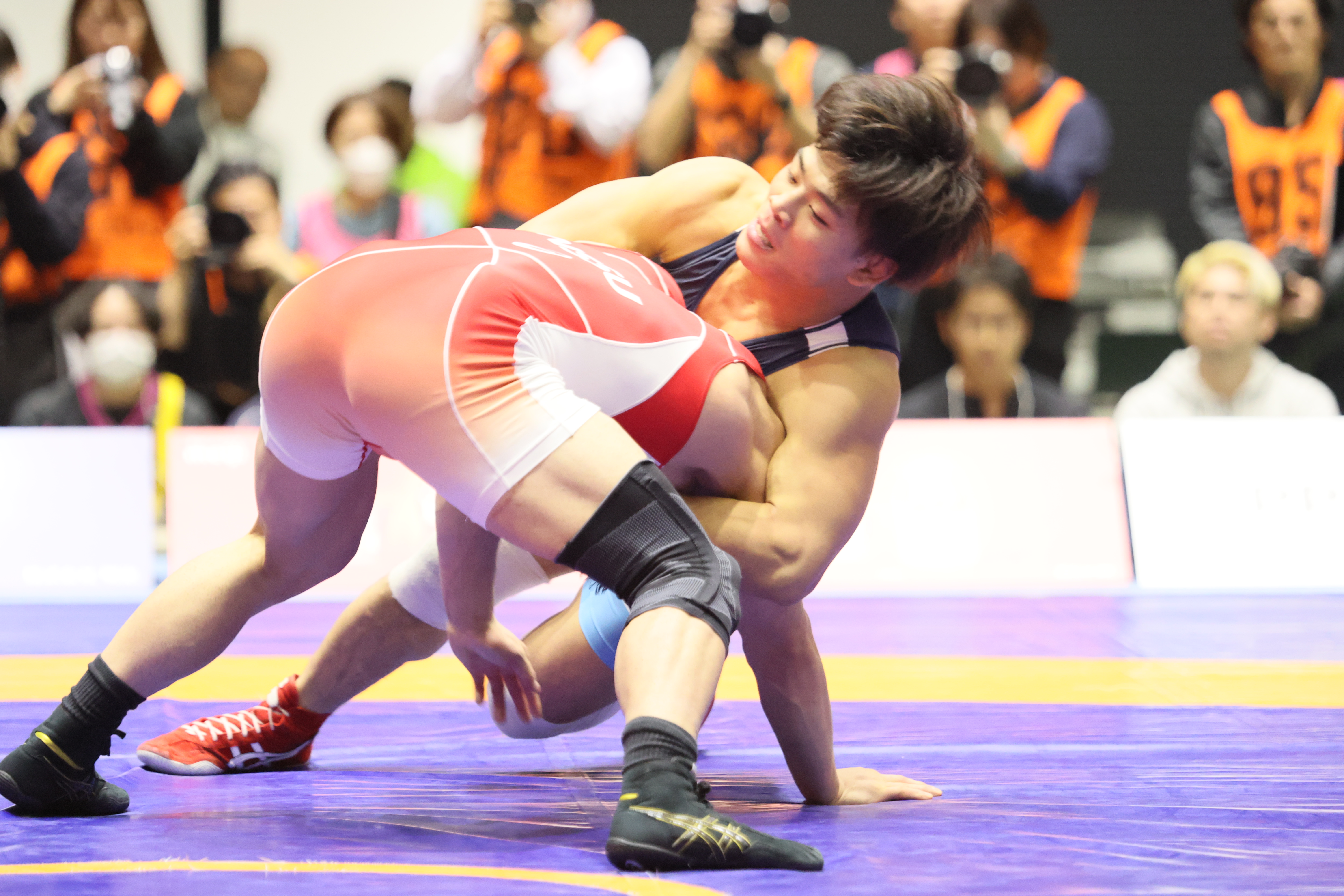 Yoshinosuke AOYAGI unsuccessfully attempts a front body lock roll in the freestyle 74kg final against Kota TAKAHASHI. (Photo: Takeo Yabuki / wrestling-spirits.jp)
Yoshinosuke AOYAGI unsuccessfully attempts a front body lock roll in the freestyle 74kg final against Kota TAKAHASHI. (Photo: Takeo Yabuki / wrestling-spirits.jp)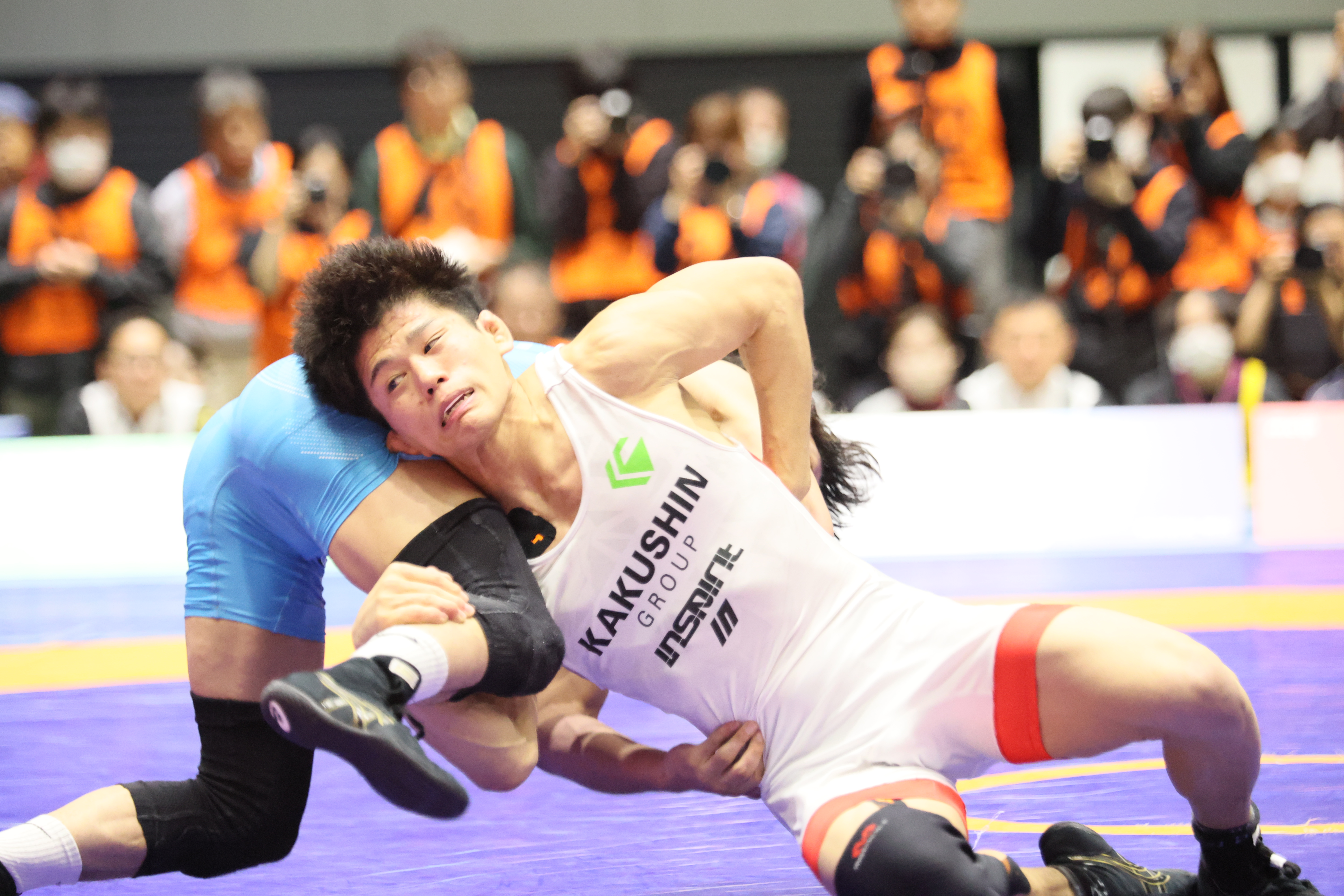 Kotaro KIYOOKA sweeps to the side for a takedown against Takara SUDA in the freestyle 65kg final. (Photo: Takeo Yabuki / wrestling-spirits.jp)
Kotaro KIYOOKA sweeps to the side for a takedown against Takara SUDA in the freestyle 65kg final. (Photo: Takeo Yabuki / wrestling-spirits.jp)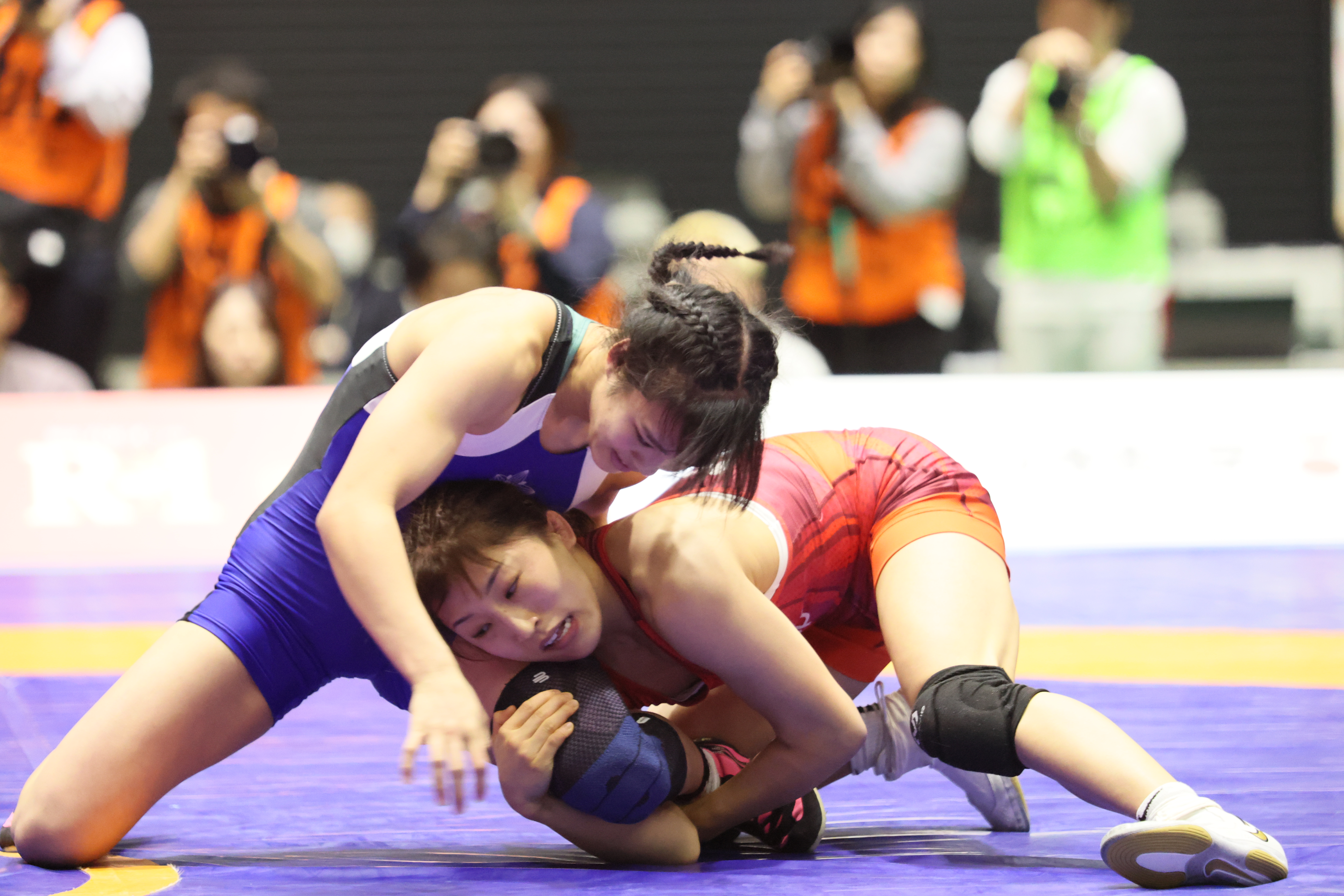 Yui SUSAKI shoots for a takedown against Haruna MORIKAWA in the women's 50kg final. (Photo: Takeo Yabuki / wrestling-spirits.jp)
Yui SUSAKI shoots for a takedown against Haruna MORIKAWA in the women's 50kg final. (Photo: Takeo Yabuki / wrestling-spirits.jp)
Share your thoughts.
Comments